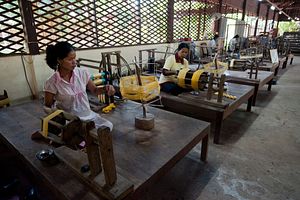After launching a strike last December, Cambodia’s garment workers have once again taken to the streets demanding a monthly minimum wage of $177. More than 500 garment workers gathered last week at an industrial park in Phnom Penh, the country’s capital, to press for higher wages. According to garment unions, about 300 factories across the country have joined the protest.
The current monthly minimum wage received by Cambodian garment workers is pegged at $100. Export earnings of the garment sector represented about a third of the country’s $15.25 billion GDP last year. There are more than 600,000 garment workers in Cambodia, the majority of them female. But aside from receiving low wages, workers also suffer from poor working conditions that often result in mass fainting incidents in various factories. Cambodia has one of the lowest minimum wages in the Asia-Pacific.
Last December, the strike mobilized tens of thousands of workers across the country to pressure the government to double the wages of garment workers, which at that time stood at $80. But labor officials rejected the full demand, and instead granted smaller increases of $15 to $20. The strike, which lasted until January, was at one stage violently dispersed by government forces, resulting in the deaths of five workers.
Learning from this debacle, the garment workers have decided to revive the campaign for a wage increase, but this time have directed their appeal to global clothing brands that buy and sub-contract supply from Cambodia. The campaign, dubbed “The buyer must provide basic wages $177,” is aimed at pressuring global brands such as H&M, Walmart, Levi’s, Gap Puma, C&A, Adidas and Zara to directly negotiate a higher wage for workers with their suppliers.
Union leaders have explained that the $177 minimum wage demand is based on the average monthly spending of garment workers. They also assert that global clothing brands have amassed more than enough profit which they could use to uplift the welfare of workers in Cambodia.
The government has reiterated its position that a substantial wage increase would scare away investors and disrupt the local economy. Fortunately, it didn’t break up the protest of workers, although police and army units were deployed near factories. Meanwhile, opposition leaders refrained from directly participating in the strike last week although they assured workers that they will bring the wage campaign into parliament.
The $177 wage increase campaign is supported by labor unions in a number of other countries. Solidarity actions were conducted outside Cambodia urging consumers not to buy clothes “tainted with exploitation and repression.”
In response, some clothing brands like H&M and Zara gave assurances that they are “ready to factor higher wages” into their pricing. They wrote Cambodian authorities and labor unions that their “purchasing practices will enable the payment of a fair living wage and increased wages will be reflected in our prices.”
Union leaders welcomed the statement but urged these companies to negotiate higher wages directly with their suppliers.
If garment workers succeed in their campaign, workers in other industries will be emboldened to petition for higher wages as well. Government workers might also ask for higher pay. But if these demands are ignored, it might spark further labor unrest. This would certainly have serious repercussions for Cambodia’s business competitiveness and political stability.
A far better outcome would be for this planned series of protests to remain peaceful and for the government to respect the right of workers to demand better living and working conditions.
































